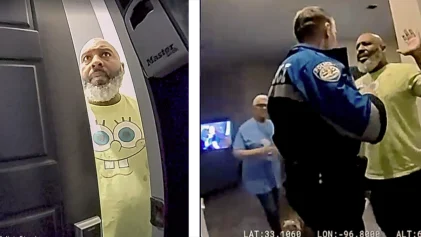Lawrenceville, Georgia, is acknowledging its racist past by recognizing one of its own who was publicly lynched for all to see 110 years ago with a new historical marker in its town square at the corner of Pike and Perry streets.
Charles Hale, who was Black, called the Atlanta suburb of Lawrenceville home along with his wife Willie and daughter in 1911. Hale was 36 years old when he was accused of assaulting a white woman on April 7, and taken to jail according to the News Herald newspaper that covered the horrific events at the time.
On April 8, a white mob of at least 200 men later stormed the Lawrenceville jail determined to find Hale and deliver their own form of punishment, a lynching.
“In the middle of the night, a white mob allegedly held Sheriff Gardner and his men at gunpoint and took Mr. Hale from jail. We know they brought him to this spot in downtown Lawrenceville, Georgia and hanged him from a telegram pole,” Lawrenceville pastor Elijah Collins said of Hale.
After Hale’s body was hanged, his mutilated body served as an attraction for white people in the community who came to the Lawrenceville square and took photos with Hale dangling in the background.
If the hanging were not bad enough, a sign was attached to Hale’s body which read “please don’t wake him,” and that phrase perplexed his niece, Inger Williams for some time.
“The one thing that troubled me the most, is the sign that read, ‘please don’t wake him. As I pondered that and tried to figure out why after all that you did, then I realized I couldn’t figure it out because it was written by someone who lived in a place of hate and racism,” Williams said.
Williams spoke candidly about her late uncle at a dedication ceremony for the historic marker. She says while growing up, she was close to her aunt Willie who was only 20-years-old when her husband was publicly executed. Williams says her aunt kept details of what happened to her uncle quiet.
“My aunt Willie Williams Hale, she taught me to be a lady, she gave me many beautiful gifts, her home was my home and as a child she sheltered me from the details of [Hale’s] horrific death,” Williams said.
A small crowd witnessed the unveiling of the historic marker in Lawrenceville square that stands in the same place Hale was hanged.
During the Jim Crow South between the 1860s and the 1960s, blatant racism and threats of lynchings were real concerns for African-Americans. Charles Hale was just one of the 4,084 documented lynchings in the Southern U.S. between 1877 and 1950 according to the Equal Justice Initiative.
The Gwinnett Remembrance Coalition helped spearhead the project to create Hale’s historical marker. The group is focused on memorializing local victims of racial terror lynchings and educate the community about its racist past.
Even though Hale did not make it past 36 years old, Williams says his wife lived to be 70 and his family went on to live full lives Hale never got the chance to do himself. “His family, his nieces, nephews, brothers-in-law and friends went on to live as healthy, independent, educated, God-fearing citizens such as myself,” she said.
More news from our partners:
5 Times White People Paid Dearly for Their Racism In the Last Year
Is This Enough? Santa Monica Offers Descendants of Displaced Black Communities Affordable Housing.


